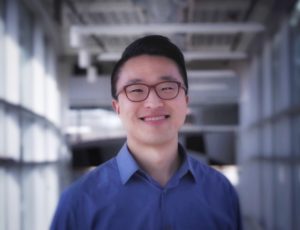Dohgyu Hwang, a fourth-year Ph.D. candidate in materials science and engineering, is the recipient of an Iowa State University Research Excellence Award and a Brown Fellowship.
“I am very honored to be a recipient of these two prestigious awards. I am glad that the awards committees recognized my work and the impact it will have on Iowa State University’s research as well the community outside campus,” said Hwang.
“Dohgyu is a fantastic researcher who pursues his work with great enthusiasm. These two awards recognize his strong contributions and highlight his bright future,” said Michael Bartlett, Dohgyu’s research advisor and assistant professor of materials science and engineering.
Prestigious awards
The University Research Excellence Award is given by the Iowa State University Graduate College to recognize graduate students for their outstanding research accomplishments. Hwang is one of only fourteen students across the university receiving the award.
“For me, this award means that I am doing meaningful work that I dreamed of. Before starting my Ph.D., I was determined to develop materials that can make the world a better place. Since I’ve started, adhesion caught my attention and has been my focus,” said Hwang.
Hwang’s Brown Fellowship will help him advance his research in adhesion. The Brown Graduate Fellowship program is administered by ISU’s Office of the Vice President of Research. The fellowship advances Iowa State University’s research in science, agriculture and space science.
“The Brown Graduate Fellowship Award will provide a platform for interdisciplinary collaboration with researchers in engineering and science, as well as commercial industries involved in healthcare advancement,” Hwang said.
Unique research inspiration
Hwang’s Ph.D. research focuses on the effects of cutting on enhancing adhesion. His work is inspired by the Japanese art of cutting, kirigami. While cuts into materials are often detrimental to performance, Hwang found that with the right approach adding cuts to adhesives can enhance the adhesion.
“I discovered a new mechanism that enables adhesives to be strong yet be removed easily. This approach improves an adhesive’s peel resistance or stickiness, without compromising easy release capability,” Hwang said.
Usually, when controlling stickiness, it would be necessary to alter chemistry. But Hwang found ways to alter the stickiness without having to change the chemicals.
“By using kirigami, our adhesive is stickier than an unpatterned adhesive, yet can be easily removed by peeling in different directions,” said Hwang. “Furthermore, we understand the underlying mechanics and physics. This allows us to efficiently design smart adhesives and rapidly create them using digital manufacturing.”
Far reaching impact
Hwang’s research will allow for significant progress with benefits extending far beyond the borders of Iowa State.
“These advancements in adhesion technology are important for the development of customized adhesives catering to patients with fragile skin, providing new routines to control adhesion for applications in biomedical bandages, wearable biomonitoring devices, and even household items that require attachment and easy removal, like temporary wall hooks,” Hwang said.
Adhesion is used in almost every field across many different areas. Hwang’s research will be highly applicable across many different fields ranging from biomedical to household objects.
“Through the remainder of my Ph.D. program, I am eager to advance the field of adhesion by exploring, improving and optimizing my adhesive design approach,” Hwang said.

